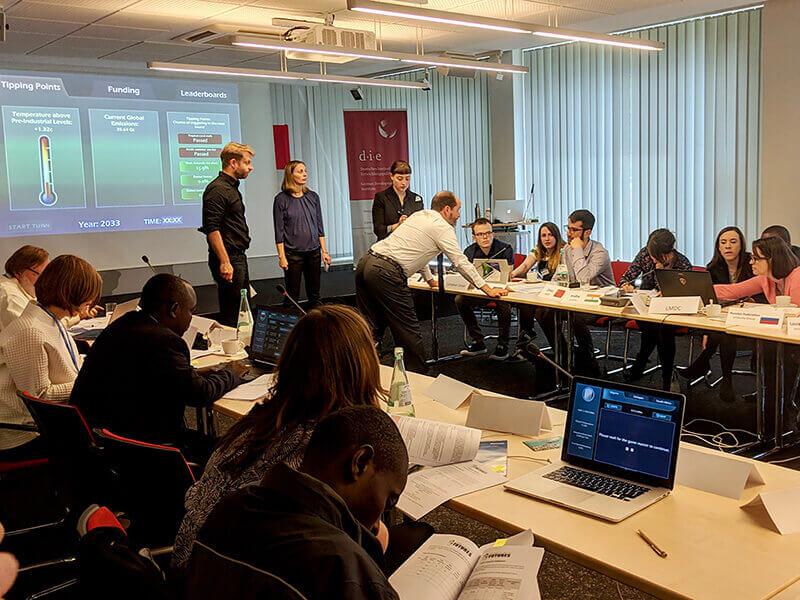May 10, 2018
Purdue researchers host climate change negotiation simulation at U.N. convention
 An interdisciplinary team of researchers from Purdue University conduct a workshop at the 2018 meeting of the subsidiary bodies of the U.N. Framework Convention on Climate Change in Bonn, Germany.
Download image
An interdisciplinary team of researchers from Purdue University conduct a workshop at the 2018 meeting of the subsidiary bodies of the U.N. Framework Convention on Climate Change in Bonn, Germany.
Download image
WEST LAFAYETTE, Ind. — Climate change is no joke, but an interdisciplinary team of researchers from Purdue University is using a serious game to help United Nations delegates understand how their decisions will impact the world in the future.
A team consisting of faculty and graduate students with the Purdue Climate Change Research Center and their international collaborators attended this year’s two-week meeting of the subsidiary bodies of the U.N. Framework Convention on Climate Change in Bonn, Germany, where delegates are drafting a set of detailed arrangements, also called the “Paris Rulebook,” to implement the Paris Agreement.
During the convention, the team conducted a number of workshops with country delegates and non-party stakeholders using the game, which envisions Earth 25 and 100 years in the future based on up to 30 players’ climate negotiations, demonstrating the importance of cooperation in meeting global temperature goals and avoiding climate tipping points – thresholds that when crossed will irreversibly alter the planet.
Purdue collaborated with scholars and students from Utrecht University and Glasgow Caledonian University to design the game.
The Gaming Climate Futures delegation consists of Purdue professors Manjana Milkoreit, Jason Reed and Linda Prokopy, as well as graduate student Roberta Weiner. Utrecht University professor Joost Vervoort and graduate student Lisette van Beck also are part of the team. A group of programming students in Glasgow Caledonian University’s applied games program helped develop the game, called “Tipping Point Negotiations.”
Milkoreit, Reed and Weiner attended the last convention in November to conduct research for the project.
“Our project is an effort to strengthen the science-policy interface in the international climate change negotiations in a novel and exciting way,” Milkoreit said. “We designed a negotiation simulation that reflects the complex scientific and political realities after the adoption of the Paris Agreement. In addition to providing a learning experience regarding climate tipping points, the simulation invites participants to imagine the future in 2118 created by their decisions. We hope that the experience we have designed will support many groups around the world in creating emotionally resonant and actionable insights into a challenging climate future.”
The workshops were well-received among delegates and non-governmental participants, who found them to be a refreshing yet insightful break from tense climate negotiations, Weiner said.
“I was energized by some of the future scenarios they imagined,” she said. “Most importantly, the game seemed to have a strong effect: In the words of one participant, ‘We're joking around now, but thinking like this makes things real.’”
The project also served as a way to emphasize the importance of climate tipping points, an important but largely ignored set of governance challenges, Reed said.
“The game offers decision makers insights about global climate tipping points and allows them to relate those global forces to the more familiar temperature goals established in the Paris Agreement,” he said.
For more information about the Gaming Climate Futures project, visit https://www.purdue.edu/breaking-through/projects/climate-tipping-points.php.
Writer: Joseph Paul, 765-494-9541, paul102@purdue.edu
Sources: Manjana Milkoreit, mmilkore@purdue.edu
Roberta Weiner, weiner0@purdue.edu
Jason Reed, reed252@purdue.edu

